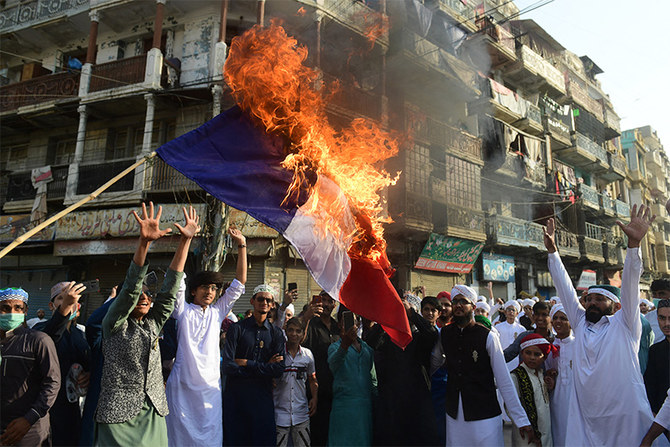ISLAMABAD: The Pakistani government said on Tuesday it would present a resolution in the National Assembly later in the day for the expulsion of the French ambassador to meet the demand of a recently banned religious party in the country.
The Tehreek-e-Labbaik Pakistan (TLP) party held violent nationwide protests to force the government to honor what it said was a commitment made to it last February to expel the French envoy before April 20 over the publication of blasphemous caricatures in France.
“It is agreed between the government and TLP after negotiations that we will present a resolution in the National Assembly today for the expulsion of the French ambassador,” Interior Minister Sheikh Rashid Ahmed said in a video statement early Tuesday.
The announcement comes after a government delegation, comprising the interior and religious affairs ministers, met the TLP leaders for negotiations in Lahore. The government representatives held at least three rounds of talks with the protesters to convince them to call off their demonstrations.
The interior minister said the TLP had agreed to end protests and sit-ins across the country.
“The process of negotiations will move forward,” he added.
He said that all cases registered against the TLP workers would also be withdrawn, adding that he would give a detailed briefing on the development in a press conference later today.
The National Assembly will also meet at 3pm on Tuesday to debate the issue.
There were also rumors that TLP chief Saad Rizvi had been released from prison, though Lahore’s Superintendent Jail Asad Javed Warraich denied any such development while talking to Arab News.
Last night, the government closed all major roads in Islamabad and Rawalpindi with shipping containers, fearing the TLP workers may move toward the twin cities to hold anti-France protests.
The government has apparently shown flexibility in its stance to end TLP protests as Prime Minister Imran Khan said in a televised address to the nation on Monday that breaking diplomatic ties with France would hit Pakistani exports to the European Union and fuel poverty, unemployment and inflation in the country.
“The biggest effect [of breaking ties with France] will be that after great difficulty our economy is rising, the large-scale industry is getting up after a long time, people are getting jobs, wealth is increasing in our country, our exports are rising and after a long time, our rupee is strengthening,” Khan said, adding that breaking ties with France would amount to severing relations with the entire European Union.
“Half of our textile exports go to the EU and that will be stopped, resulting in unemployment, devaluation of the rupee, increase in inflation and poverty,” Khan said. “We will be at loss but this won’t make any difference to France.”
Violent protests by the rightwing group rocked the country since last Monday when TLP chief Saad Rizvi was arrested in Lahore for threatening the government with rallies if it did not expel the French envoy to Islamabad over cartoons of the Prophet Muhammad (peace be upon him) published in France last year.
The protests paralyzed major cities and highways all week, leading to the killing of six policemen, according to the government. Photographs of the police, with their heads, legs and arms heavily bandaged, were posted on social media by their captors through the week.
On Sunday, TLP said three of its members were killed during clashes outside the TLP headquarters in the eastern city of Lahore. The group also took a number of police officers and paramilitary troops hostage, releasing 11 policemen in the early hours of Monday after negotiations with the government.
The riots also prompted the French embassy last week to recommend all its nationals to temporarily leave the country.
Last week, the interior ministry said it was moving to have the TLP party banned for attacking police and paramilitary troops and disrupting public life during its protests. The interior ministry’s decision was approved by the federal cabinet, thought it needs to be ratified by the Supreme Court for the official dissolution of the group.
In October 2020, protests broke out in several Muslim countries, including Pakistan, over France’s response to a deadly attack on a teacher who showed the blasphemous cartoons to his pupils during a civics lesson. French President Emmanuel Macron defended the caricatures as freedom of expression.




















